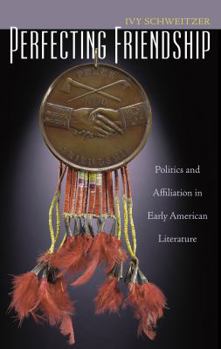Perfecting Friendship: Politics and Affiliation in Early American Literature
Select Format
Select Condition 
Book Overview
Contemporary notions of friendship regularly place it in the private sphere, associated with feminized forms of sympathy and affection. As Ivy Schweitzer explains, however, this perception leads to a misunderstanding of American history. In an exploration of early American literature and culture, Schweitzer uncovers friendships built on a classical model that is both public and political in nature.
Schweitzer begins with Aristotle's ideal of "perfect" friendship that positions freely chosen relationships among equals as the highest realization of ethical, social, and political bonds. Evidence in works by John Winthrop, Hannah Foster, James Fenimore Cooper, and Catharine Sedgwick confirms that this classical model shaped early American concepts of friendship and, thus, democracy. Schweitzer argues that recognizing the centrality of friendship as a cultural institution is critical to understanding the rationales for consolidating power among white males in the young nation. She also demonstrates how women, nonelite groups, and minorities have appropriated and redefined the discourse of perfect friendship, making equality its result rather than its requirement. By recovering the public nature of friendship, Schweitzer establishes discourse about affection and affiliation as a central component of American identity and democratic community.
Schweitzer begins with Aristotle's ideal of "perfect" friendship that positions freely chosen relationships among equals as the highest realization of ethical, social, and political bonds. Evidence in works by John Winthrop, Hannah Foster, James Fenimore Cooper, and Catharine Sedgwick confirms that this classical model shaped early American concepts of friendship and, thus, democracy. Schweitzer argues that recognizing the centrality of friendship as a cultural institution is critical to understanding the rationales for consolidating power among white males in the young nation. She also demonstrates how women, nonelite groups, and minorities have appropriated and redefined the discourse of perfect friendship, making equality its result rather than its requirement. By recovering the public nature of friendship, Schweitzer establishes discourse about affection and affiliation as a central component of American identity and democratic community.
Format:Paperback
Language:English
ISBN:0807857785
ISBN13:9780807857786
Release Date:December 2006
Publisher:University of North Carolina Press
Length:288 Pages
Weight:0.89 lbs.
Dimensions:0.7" x 6.3" x 9.2"
Customer Reviews
0 rating





